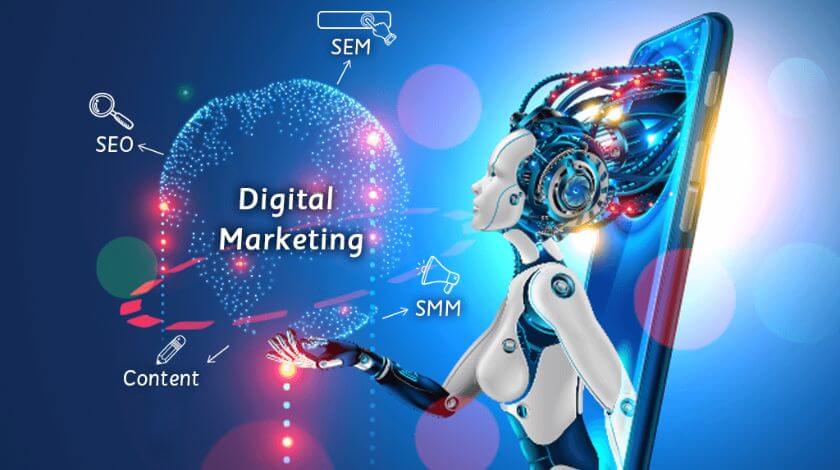Artificial intelligence (AI) has rapidly transformed various industries, and digital marketing is no exception. As technology evolves, so does the way businesses connect with consumers. The future of AI in digital marketing promises to enhance customer experiences, optimize strategies, and drive growth in unprecedented ways. In this blog post, we’ll explore the key trends and developments shaping the future of AI in digital marketing.

Table of Contents
Toggle1. Hyper-Personalization
One of the most significant impacts of AI in digital marketing is the ability to achieve hyper-personalization. AI algorithms analyze vast amounts of consumer data to understand preferences, behaviors, and purchase history. This enables marketers to create highly personalized content and product recommendations, leading to more relevant experiences for consumers. In the future, AI will further refine personalization by leveraging real-time data, allowing brands to adapt their messaging and offerings instantly based on individual user interactions.
2. Enhanced Customer Insights
AI-powered analytics tools can process and analyze data far more efficiently than traditional methods. These tools can identify trends, customer segments, and behaviors, providing marketers with valuable insights into their target audience. As AI continues to evolve, businesses will gain access to more sophisticated predictive analytics, allowing them to anticipate consumer needs and preferences. This data-driven approach will empower marketers to make informed decisions and optimize their strategies for better outcomes.
3. Automated Content Creation
Content creation is a critical aspect of digital marketing, and AI is poised to revolutionize this area. AI-powered tools can generate high-quality written content, including blog posts, social media updates, and product descriptions. While human creativity will always play a role in content creation, AI can assist by providing data-driven insights, optimizing content for SEO, and automating repetitive tasks. This will free up marketers to focus on strategic planning and creative initiatives.
4. Chatbots and Conversational Marketing
Chatbots have already begun to reshape customer service, and their role in digital marketing will only expand in the future. AI-driven chatbots can provide instant responses to customer inquiries, assist with product recommendations, and facilitate transactions, all while maintaining a personalized experience. As natural language processing (NLP) technology improves, chatbots will become more sophisticated, enabling them to engage in meaningful conversations and gather valuable data for marketers. This will enhance customer satisfaction and drive engagement.
5. Predictive Analytics for Campaign Optimization
Predictive analytics, powered by AI, will become a cornerstone of digital marketing strategies. By analyzing historical data and identifying patterns, AI can forecast future consumer behavior and campaign performance. This allows marketers to allocate resources effectively, optimize ad spending, and refine targeting strategies. As AI continues to improve its predictive capabilities, businesses will be better equipped to create campaigns that resonate with their audience and deliver measurable results.
6. Voice Search and AI Assistants
The rise of voice search and AI assistants is changing the way consumers interact with technology. As more people use voice commands to search for information, businesses must adapt their digital marketing strategies accordingly. AI will play a crucial role in optimizing content for voice search by understanding natural language queries and providing relevant responses. This shift will necessitate a focus on conversational keywords and phrases, changing the landscape of search engine optimization (SEO).
7. Dynamic Pricing and AI Algorithms
Dynamic pricing, enabled by AI algorithms, will become more prevalent in digital marketing. These algorithms analyze real-time market data, consumer behavior, and competitor pricing to adjust prices dynamically. This will allow businesses to maximize revenue while ensuring competitive pricing. As consumers become accustomed to personalized pricing strategies, AI-driven dynamic pricing will enhance customer satisfaction and loyalty.
8. AI in Social Media Marketing
Social media platforms are increasingly utilizing AI to enhance user experiences and improve advertising strategies. AI algorithms analyze user interactions to deliver more relevant ads and content to users. In the future, businesses will leverage AI to identify emerging trends, optimize ad placements, and engage audiences effectively. This will lead to more efficient social media marketing campaigns that resonate with users and drive conversions.
9. Ethical Considerations and Transparency
As AI becomes more integrated into digital marketing, ethical considerations will come to the forefront. Consumers are increasingly concerned about data privacy and how their information is used. Marketers must prioritize transparency and ethical practices in their AI-driven strategies. Building trust with consumers will be essential for long-term success, and brands that prioritize ethical AI usage will stand out in a crowded marketplace.
10. Continuous Learning and Adaptation
The landscape of digital marketing is ever-changing, and AI will play a pivotal role in helping marketers adapt to new trends and consumer behaviors. Machine learning algorithms enable systems to learn from past data, continually improving their performance over time. This adaptability will empower marketers to stay ahead of the curve, optimizing their strategies based on real-time insights and consumer feedback.
Conclusion
The future of artificial intelligence in digital marketing is bright, with endless possibilities for innovation and growth. By harnessing the power of AI, businesses can enhance personalization, gain valuable insights, automate processes, and optimize their marketing strategies. However, as technology continues to evolve, marketers must remain vigilant about ethical considerations and prioritize transparency to build trust with consumers. Embracing AI is not just a trend; it’s a strategic imperative for businesses looking to thrive in the competitive digital landscape. As we move forward, those who leverage AI effectively will set themselves apart, creating meaningful connections with their audiences and driving sustainable growth.


No responses yet